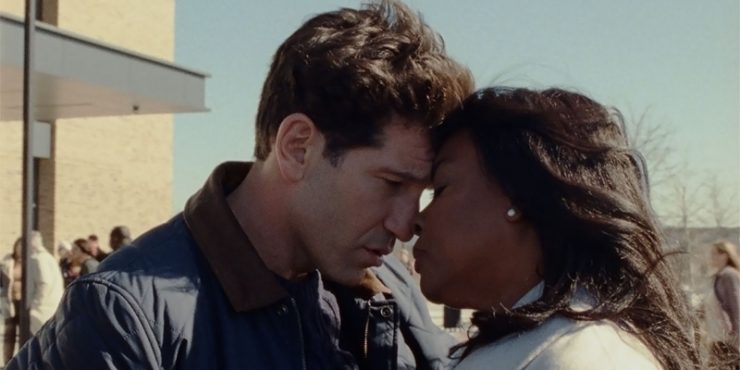Ava DuVernay’s decision to make a narrative adaptation of Isabel Wilkerson’s non-fiction book Caste, is a daring choice. It leaves her vulnerable to criticism and many have jumped at the opportunity. It’s an ambitious decision, trying to wrestle emotional payoff out of intellectual argument. Wilkerson’s book doesn’t ask its readers to view it this way, but DuVernay bypasses the more conservative adaptation option: a documentary. The thesis laid out in Caste (that historical and international pillars of caste are the main cause of oppression throughout the world) is complex and contradicts a lot of tightly held conventional wisdom. Explaining it requires a level of dissertation that’s difficult to do when you’re also trying to tell a story with characters.
And it is difficult for DuVernay, as her film adaptation, Origin, often does buckle under the weight of its self-imposed burdens. But there is something quite fascinating here. In making her film ostensibly about Wilkerson’s creation of the Caste book, DuVernay does manage to both get the germ of Wilkerson’s points across while still crafting an effective character arc. The complexity of its construction – and the stridence of both DuVernay and her script – make it easy for those to claim it doesn’t “work”, and perhaps it doesn’t in some antiquated definition of how films should “work”. I still found myself riveted by what DuVernay puts together here. Origin is attempting to connect the oppression of the whole world within a single concept. Whether or not it succeeds in that is secondary to how well its arguments are displayed.
Aujenue Ellis-Taylor plays Isabel Wilkerson, a Pulitzer Prize-winning journalist with a best-selling book on her resume. That book is about the Great Migration of Blacks from the South following the end of American slavery. Its success has gained her praise and awards, but it has also narrowed the scope in which editors think of her. When Trayvon Martin is killed by George Zimmerman, a magazine editor (Blair Underwood) brow beats her to write something about it. The Martin incident does leave Isabel shocked with sorrow and anger, but she cannot fathom how another column about the evils of racism could make things better. She wants to take a more macro view. What is the reason for the persistence of racism – in both America and around the world? If everyone knows it’s evil, why does it continue on?
The project – discovering the roots of prejudice – is daunting on its face, but things get harder when she’s met with sudden and heartbreaking tragedy. Her husband, Brett (Jon Bernthal), dies unexpectedly in their bedroom one night, while her mother, Ruby (Emily Yancy), dies after years of illness. The two events so close together – one with an ounce of expectation and the other a total blindside – puts Isabel into a clinical state of grief. Her cousin, Marion (Niecy Nash), provides presence and shows emotional support, but Isabel can hardly fathom her next step. When she recovers, she realizes that the only way to exorcise her sadness is through her work, to put all this pain into discovering the true origins of why humanity fails at taking care of its own.
Especially in its first half, Origin feels like an unbalanced fit of too many different ideas. And to be clear, many of the film’s supporting characters voice this frustration as well. It often appears that DuVernay is arguing for the film’s significance within the screenplay. Isabel travels to Germany and India, she studies the beginnings of Nazism and the centuries-long Dalit culture in the subcontinent. She thinks about her marriage to a white man, and the tension it brewed in her family and in the culture at large. She thinks these are all part of the same thing. But how can they be? I do think that if DuVernay expects this film to be a crisp explanation of Wilkerson’s book, then Origin actually is a failure. But for all the adamance in Isabel’s case, Origin succeeds in the uncertainty, in the perseverance of spirit against long odds.
As Isabel Wilkerson, Ellis-Taylor gives an astounding performance. The waves of tragedy she meets both in her personal life and around the world would more often inspire a broader, more verbose performance but Ellis-Taylor and DuVernay prefer a subtler approach. Isabel meets skepticism every step of the way (no doubt mirroring DuVernay’s own struggles), but Origin doesn’t depend upon grand speeches of defiance. Instead, Ellis-Taylor crafts a character of dignity and constraint. Her ultimate success is not a win over the haters, but a victory for her own self-perception. As Marion, Nash’s smaller role is crucial, and is in many ways an audience surrogate, coming to understand Isabel’s thesis only over time. Nash, long considered only a comic performer, has proven to be one of our most versatile and effective actors.
The supposed shortcomings of this film are what give it proper character. One could (and many have) railed against DuVernay’s film as overambitious at best or overcomplicated at worst, but it’s these co-called failings of structure that separate Origin from anything that has come before it. If one is challenged with making a narrative out of a non-fiction book like Wilkerson’s Caste, I’d argue that Origin is the best possible outcome. I’ve seen many argue that the fault is in the attempt. I can tell that most storytellers would turn away from the challenge; and, disappointingly, many critics seem too narrow-minded to appreciate the effort. DuVernay doesn’t hide her emotional connection to the material, a sentimentality that will turn many off from the beginning. Her confidence and vision is what separates her from other contemporary directors, but if you’re willing to watch the film on her terms, you unlock the secret power of Origin: it’s the message, sure, but it’s also the delivery which sets it apart.
Written for the Screen and Directed by Ava DuVernay










